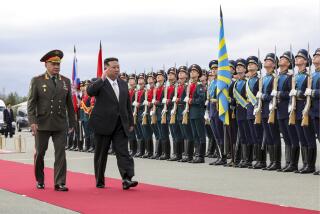Chinese Official Upbeat on His Moscow Trip
- Share via
BEIJING — Communist Party General Secretary Jiang Zemin left here today for a Sino-Soviet summit aimed at building greater cooperation between the giant neighbors--and perhaps thereby helping to save communism from worldwide collapse.
“It gives me great pleasure that I’m going to pay this visit to the Soviet Union after a lapse of so many years,” Jiang, who worked in the Soviet Union as an automotive engineering trainee in the mid-1950s, said at an airport press conference just before departure. “I’m convinced that this visit will serve to further promote the development of friendly relations between the two countries and peoples.”
Jiang’s five-day trip will be the first to Moscow by a Chinese Communist Party chief since Chairman Mao Tse-tung traveled there 34 years ago. Jiang will be returning Soviet President Mikhail S. Gorbachev’s groundbreaking 1989 visit to Beijing.
Jiang said that while in Moscow, he expects to sign an agreement concerning demarcation of the sector of the Sino-Soviet border that runs from Mongolia to the Sea of Japan. Chinese and Soviet troops clashed over the disputed border in 1969.
The Beijing summit, which ended three decades of estrangement between the former allies, was overshadowed by pro-democracy protests that ended in a bloody crackdown after Gorbachev returned home. Leaders of both nations were preoccupied for the rest of that year with domestic and international crises that disrupted development of bilateral ties.
Little more than a year ago, in internal documents circulated among party members, hard-line Chinese leaders were angrily denouncing Gorbachev for his domestic political reforms and for having permitted democratic revolutions to sweep Eastern Europe.
Jiang’s upbeat comments reflect an apparent Chinese decision that, as Gorbachev struggles to retain power and prevent the breakup of the Soviet Union, he now is preferable to any likely alternative--and that, in any case, it is essential to move forward with improved Soviet ties.
“The Chinese came to the conclusion that ‘Gorbachev may be wrong, but we’ve got to build this relationship up,’ ” commented a Western diplomat who spoke on condition of anonymity. “They realize that if Gorbachev goes, most likely there will be a fragmentation of the union and rampant anti-socialism, anti-communism. . . . If the Soviet Union starts falling apart, what influence is this going to have on China’s far-flung provinces?”
Jiang, who will be accompanied by Defense Minister Qin Jiwei, is also expected to talk with Gorbachev about economic cooperation, further relaxation of military tensions and the possible sale of Soviet jet fighters and other military equipment to China.
For China’s leaders, any collapse of communism in the Soviet Union would further call into question their own right to rule. For Moscow, improved ties with Beijing offer direct economic benefits plus opportunities to reduce military expenditures.
In a gesture of support for Gorbachev that also showed how China is no longer the “little brother” in the relationship, Beijing in March approved a $715-million loan for Soviet imports of Chinese grain, meat and consumer products.
Western nations generally have taken a calm view of closer Sino-Soviet relations. This “shows how the world has changed,” the diplomat commented.
More to Read
Sign up for Essential California
The most important California stories and recommendations in your inbox every morning.
You may occasionally receive promotional content from the Los Angeles Times.













